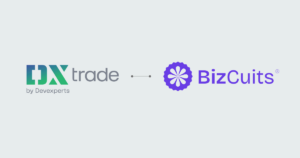For Large Enterprises, Fintech Isn’t Just About Efficiency – It’s Driving Agility
It’s now ten years since renowned Silicon Valley VC Marc Andreessen stated that software is eating the world, and its appetite remains as insatiable as ever.

by Karym Murphy, Managing Director of Horizon8 in the US
It’s now ten years since renowned Silicon Valley VC Marc Andreessen stated that software is eating the world, and its appetite remains as insatiable as ever. Although the pandemic caused growth to stagnate briefly in 2020, Statista predicts that the comeback will be stronger than ever. The software-as-a-service (SaaS) market is expected to expand by nearly 20% in 2021, up to $123 billion.
From the enterprise standpoint, the continuing software boom is easily explained by the almost limitless array of use cases and benefits. However, the demand for B2B SaaS solutions also speaks to the increasing pressure on firms to remain agile and efficient while simultaneously navigating an increasingly uncertain environment. The Covid-19 pandemic triggered a move to Work From Home. Facing this new remote working environment triggered the need for business agility. Alongside this, geopolitical tensions are making institutions reconsider their data centre locations and operating models. Could proprietary in-house software become a thing of the past?
Buy vs. Build
When evaluating the trade-offs between buying and building IT solutions, firms are increasingly finding that buying in a ready-made solution offers many competitive benefits. These include a faster time to market, increased efficiencies, reductions in labour-intensive processes, deeper insights through data, and more.
On the flip side, firms attempting to implement their own solutions can often find that technology outpaces them during the time it takes to reach a deployment. Therefore, organizations choose SaaS as it helps them maintain focus on their core business, remaining agile enough to switch solutions quickly if the need arises.
As a result, many companies now use software solutions to manage back-end operations, including time and attendance tracking, payroll, accounting, and more. Software tools are also integrated throughout sales, marketing, and customer service, led by firms such as Salesforce and Zendesk.
Perhaps most critically, firms are increasingly relying on external suppliers to support IT security and protection against cyberattacks. For example, content delivery network
Cloudflare reports that while it’s seeing fewer distributed denial of service (DDoS) attacks targeting its servers, it increasingly sees larger and more sustained attacks.
The trend highlights that most firms would be under-equipped to protect from such attacks in the longer term, without significant efforts on their part. In the same way that smartphones have become almost essential to our daily lives, the software is now an integral part of how we work on a daily basis – even if we’re not always conscious of it.
Fintech “Top Disruptor” for Finance
In the financial services sector, the evolving digital landscape even has its own name – fintech. The term itself only emerged into the mainstream in 2014, but it has become a byword for the tech-enabled transformation in finance. Challenger banks led the charge, and their customer-centric, digital-first approach has continued to serve them well throughout the pandemic. Seven US challengers recorded user growth of nearly 40% in 2020 compared to 2019.
However, fintech’s reach goes beyond the inherent competition between traditional banks and their digital rivals. According to KPMG, financial institutions invested over $27 billion in fintech between 2015 and 2019, with 57% of institutional respondents stating that fintech was the top source of disruption for their industry.
Transforming Legacy Processes
Institutions are increasingly turning to fintech firms to help streamline and digitalize outdated back-end processes and systems, which often still rely on a degree of in-house human involvement. Often hidden from plain sight, these areas can absorb budgets and hamper organizational agility.
Compliance is one such example, with one survey suggesting that half of the finance firms are spending between six and ten per cent of revenues on compliance costs. The burden of conducting in-depth know-your-customer (KYC) and anti-money laundering checks also extends to other industries, including legal, insurance, and accounting. However, it’s both cumbersome and slow for institutions to onboard new clients using legacy manual processing, often taking up to a month in document sourcing and verification.
Horizon8 offers a solution that alleviates the headache with a complete, all-in-one solution that automates the end-to-end customer due diligence, KYC, and AML processes. The Valid8Me identity platform empowers users to own and take control of their own data while removing the process-based headaches for corporate clients and onboarding firms. It’s already being used by businesses including Grant Thornton and Mazars, freeing up time and costs, allowing organizations to focus on more value-adding activities.
Connectivity is another area that consumers take for granted, increasingly demanding the ability to tap into a variety of payment services across apps and online services. Failure to keep apace of these demands can result in a rapid loss of competitive edge. However, the reality of building these connections can cause significant friction in the background.
TrueLayer is a fintech firm providing financial APIs that are dedicated to solving this particular pain point. It provides an interface between applications and financial institutions, allowing consumers to get verified and initiate payments. The firm now claims to funnel 50% of all open banking traffic in the UK, Ireland, and Spain.
Data is Still King
Fintech is also central to the data revolution in finance, an industry where the appetite for data has existed long before the current information feeding frenzy. Even before figuring out how to harness data for maximum effect, companies are looking for ways to store, manipulate and report on data allowing companies to offer value-added solutions to their customers.
Snowflake is a company that many large enterprises, including financial firms, are adopting to replace outdated data warehouses. For instance, it powers Blackrock’s managed-data-as-a-service solution called Aladdin Data Cloud, allowing the firm to provide data management services to its clients that help drive their investment decisions. It’s an example of how Blackrock has freed itself from the burden of needing to manage voluminous data while providing a service that’s of significant value to its customers.
Tink, a Swedish fintech firm, offers a platform that takes raw financial data from across its entire partner network and transforms it into actionable insights. Banks and fintechs can then use the data to develop and refine their product lines. The platform has now integrated over 3,000 banks and institutions, reaching over 250 million customers. The network effect makes the data provided richer and more meaningful.
Service providers like those mentioned above are not simply an IT firm, but an enabler to deliver a better service quality and have additional values like cyberattack support, data compliance and resilience, to name but a few.
Looking forward, there’s plenty of evidence that more disruption will follow – particularly in the fintech space. Emerging technologies such as AI and blockchain offer significant opportunities. Those firms taking the opportunity to streamline and become more agile now will be best placed to capture the opportunities around the corner.









